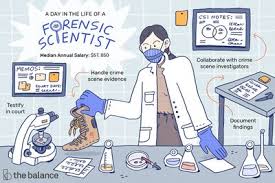Forensic science graduates are highly employable, both in the specialist area of forensic investigation and in other associated fields requiring an enquiring, scientific and legal mind
Job options
Jobs directly related to your degree include:
- Analytical chemist
- Biomedical scientist
- Crime scene investigator
- Detective
- Forensic scientist
- Scientific laboratory technician
- Toxicologist
Jobs where your degree would be useful include:
- Border Force officer
- Forensic computer analyst
- Further education teacher
- Higher education lecturer
- Police officer
- Science writer
- Secondary school teacher
Work experience
It's essential that you gain some laboratory work experience in order to prove you have the necessary skills, such as attention to detail and accuracy, as well as having knowledge of laboratory techniques. Work experience is more likely to be found in a scientific or hospital laboratory than a forensic setting due to the sensitive nature of the work.
Working for the police is another good option, for example as a special constable, as this will provide you with a valuable insight into police work and the role of forensics.
It may also be possible for you to find internships that contain some laboratory work with smaller employers. These positions may be voluntary but could lead to paid employment.
Typical employers
The government outsources most of its forensic work, so job opportunities mainly arise in private companies.
Other major employers of forensic science graduates include police support departments, the Ministry of Defence (MoD), particularly the Defence Science and Technology Laboratory, the NHS and educational or private research laboratories. Opportunities can often be found by exploring the strong links between academic departments and employers, so check with your university for potential contacts.
Skills for your CV
Studying forensic science develops skills specific to laboratory work including:
- attention to detail
- analytical and interpretative skills
- a methodical approach
- patience and concentration, as laboratory work can be routine and detailed.
Some skills are transferable, such as:
- teamwork and working independently
- presentation skills, as you need to be an effective verbal and written communicator, for example when compiling court reports.
There are personal qualities that may be useful, such as having a resilient outlook - some of the work is upsetting and unpleasant. You could be asked to work unsocial hours, so a flexible approach is helpful.








